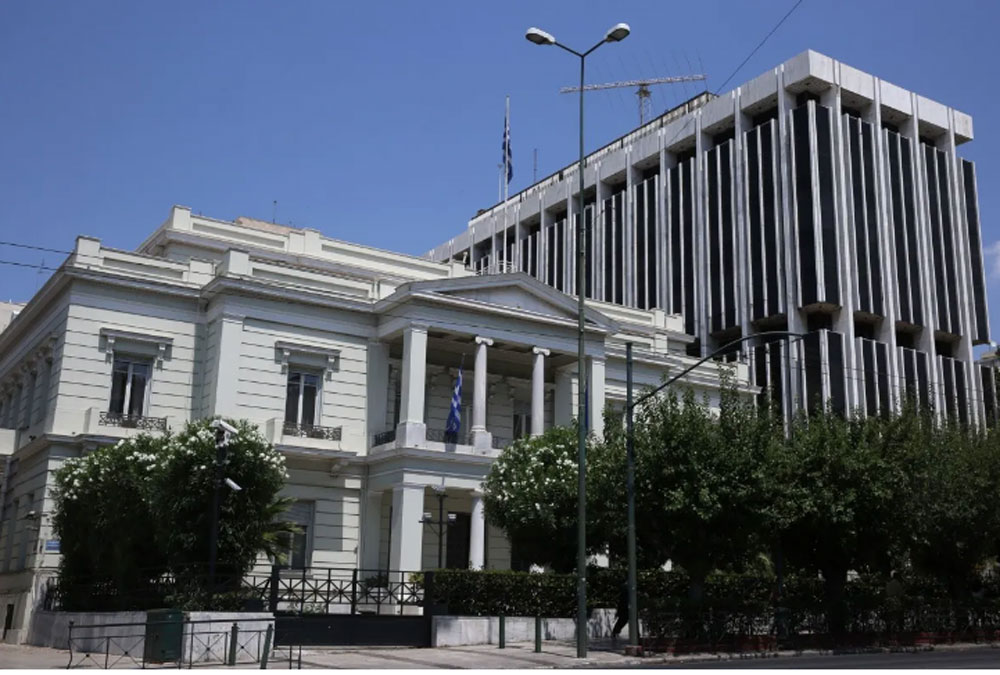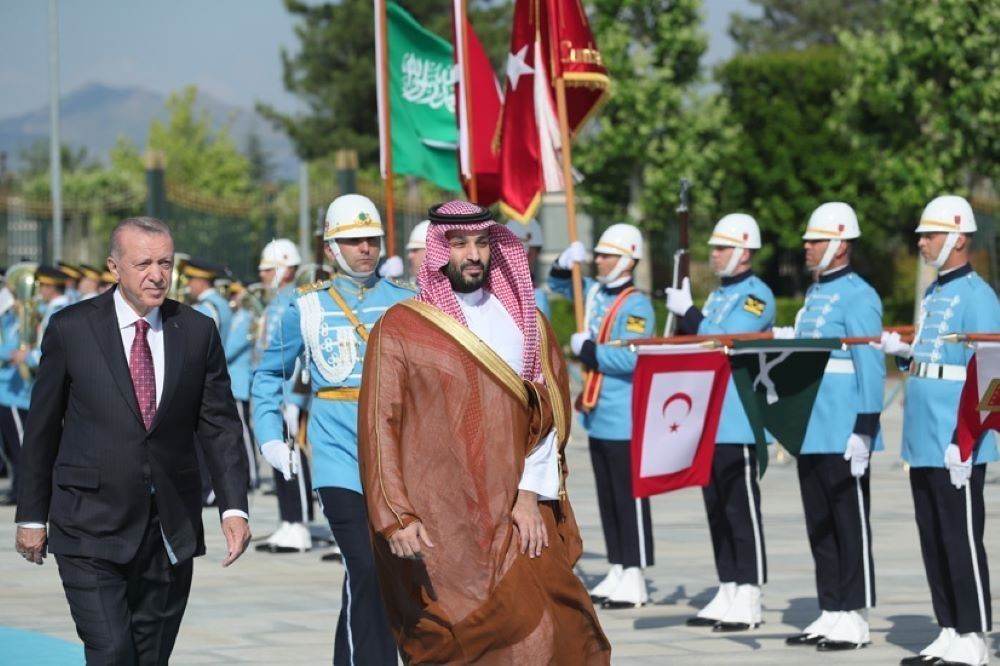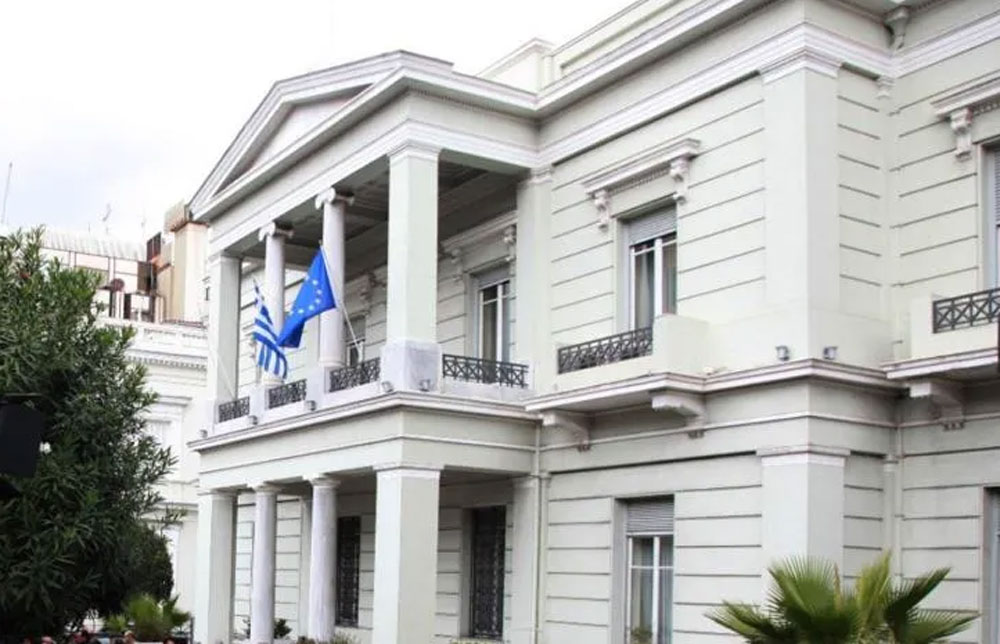
What the U.S. policy toward Turkey should be? Erdogan must abandon bullying Greece in the Aegean Sea and in Cyprus

FILE PHOTO: Islamist President of Turkey Recep Tayyip Erdoğan welcomed Crown Prince Mohammed bin Salman of Saudi Arabia with an official ceremony at the Presidential Complex. Photo via Turkish Presidency
The former Secretary of State, Mike Pompeo shaped a new strategy that was in accordance with changes in the Eurasian geopolitical landscape. His heritage is rich, however, he was in power for only two years.
The Abraham Accords are the cornerstone of his heritage and he proved that in international politics, nothing is impossible unless it neglects realistic solutions which are beneficial for all parts of an agreement. Israel’s agreement with the Arabic states brought anxiety to Tehran and Ankara because they had never believed that the U.S. would be back in the Middle East with a less intervening formula, adopting a useful indirect approach.
That belief was substantial to Erdogan’s mindset that drove Turkey to invade almost everywhere in the Middle East (Northern Iraq, Syria, and Libya). Trying to fill the void that the U.S. left behind, Turkey became the source of problems in the Middle East. The Abraham Accords comprise an exceptional paradigm for shaping a new American-friendly security architecture without adopting the false thoughts that some states are ”irreplaceable”.
- The old enemies followed the path of cooperation without the mediation of Turkey. Secretary Pompeo has not only busted the myth of ”useful and irreplaceable Turkey” but also neglected twice to meet with his Turkish counterpart when he paid a visit to the Ecumenical Patriarchate in Constantinople. After all, in December 2020, held Turkey accountable for violating the CRIEEA paragraph of CAATSA and imposed sanctions on Turkey.
Finally, in the NATO Summit in the summer of 2020 accused Turkey of its illegal and aggressive behavior against Greece. Now, the Biden administration sends the wrong messages to Erdogan even though the American president himself detests Erdogan’s policies. What are the sources of the State Department’s appeasement and what the U.S. foreign policy should look like toward Turkey?
Before Pompeo took severe measures to deal with Turkish malicious policies, Erdogan had crossed the lines several times. Using as a pretext that Kurds threaten the very existence of Turkey, Erdogan, and the dangerous decision-makers that surround him, tried to redraw the map of the whole region.
On the other side, the U.S. officials were embarrassed by the Turkish militarization of foreign policy. It is true that in the aftermath of the Arab Spring, nobody in Washington wanted to touch the affairs of MENA. The Obama administration tended to believe the convenient truth that Erdogan stressed, but it was nothing else but another false reason among many.
According to Erdogan, Turkey could be the ”salesman” of a soft political Islam that would never confine the Arab states into radical policies. But as always, Erdogan says one thing and does another. What are the consequences of the American inertia towards Turkey? First and foremost, made a strategic coalition with Russia in Syria and Libya.
Erdogan saw that even though he was a warlord, the U.S. was reluctant to make Turkey pay any price. This is the dangerous path of Chamberlain’s type of appeasement. After Turkey became a part of every war in the region, now it threatens the existence of NATO by holding Sweden and Finland as hostages, something that naturally makes Putin smile. What’s next for the U.S-Turkish relationship? Turkey is using as leverage its membership in NATO.
Giving an answer to the question of what the U.S. should do toward Turkey should be mentioned as the consensus of our times. Making it clear that Erdogan couldn’t care less about the collective security that NATO represents, NATO expansion, and, of course, the Western values. But the main argument of those who adopt the policy of appeasement toward Turkey is that there is a segregation between Erdogan and Turkey.
This is completely illusory, to say at least. Erdogan came into power in 2002 and he started his policy toward the U.S. by blocking the U.S. weaponry to trespass via Turkish territory and circulating Iraq during the war. After that, he never stopped blackmailing the U.S. ever since. Moreover, the appeasement group should take into consideration that, after 20 years of Erdogan’s presidency, both Turkish society and the Turkish bureaucracy have critically been transformed into something that is far from being described as a pro-western stance.
Turkey is getting more and more similar to Iran and even the E.U. accepted that Turkey is not only made any progress regarding its European path for membership but on the contrary, there is a significant deterioration of the Turkish EU candidacy. The Turkish deep state has now consisted of pro-Russian, pro-Chinese, and radical Muslim bureaucrats and it will take many years to re-establish a pro-western political elite.
- In the meantime, a superpower like the U.S. could not wait for fast-track changes even if Erdogan and his staffers will lose in the coming elections. Secondly, there is an essential factor that produces the American appeasement of Turkey. So, another argument that the appeasing group in the U.S. stresses is that the U.S. lost Iran and Pakistan, and thus, Washington couldn’t afford a potential loss of Turkey.
This argument is based on a Cold War analysis, but here, there is some bad news. The structure of the current international order is multipolar and not bipolar. Fortifying the accuracy of the previous argument, it is possible to examine the current synergies in the Eastern Mediterranean. Greece, Cyprus, and Israel agreed to formulate their trilateral cooperation.
The role of Egypt is also augmenting and other states like the UAE, Saudi Arabia, and Jordan play an important role. The model of the energy cooperation is also speaking loud about the myth-busting of the ”irreplaceable Turkey”. While Turkey was bullying Greece and Cyprus in the Eastern Mediterranean by promoting the ridiculous ”Mavi Vatan” which backed it with the illegal agreement with Libya, the other countries of the region founded the East Med Gas Forum in order to coordinate their policies in the region.
The second keyword that easily is expressed by the appeasing group in the U.S., is a wordy generalization. According to this oblivion, Turkey ”remains useful for the U.S.”. This claim is as idle as the ”irreplaceable Turkey” one. How could be ”useful” is a country that makes nothing to protect the U.S. interests in at least three regions? (the Caucasus, the Middle East, the Black Sea).
Unfolding the Turkish foreign policy could easily drive to an inconvenient truth for the appeasing lobby in Washington. Turkey believes that its security interests are closer to Moscow than to the U.S. Making it crystal clear, Turkey has been declining from the U.S. interests in multiple regions for at least 12 years. Now, the ”utility” of Turkey speaks a so language that poses blackmailing dilemmas to Sweden and Finland, working again for Putin’s plan.
- So, back to basics; Turkey is haggling in the souk in NATO in the grace of Russia. Therefore, the only “utility” of Turkey is for Russia, which has never neglected that its major plan is to provoke chaos and disorder in NATO. A matured foreign policy is based on the acceptance of facts and when it comes to Turkey, the U.S. officials should accept that Turkey has already made its bed and it is of course irreplaceable, but not for the West. It is for Putin.
In short order, the Turkish stance invites questions for the U.S. officials on what to do. Firstly, a superpower and the leader of western values should pose some rules and criteria during the era of the multipolar world, in order to secure cohesion and inclusiveness of the pro-western international organizations.
That calls for a wise usage of signs of power by avoiding signaling weakness. The U.S. appeasing group should create an example out of Turkey. A leading power should shape the rules of the western block. If the U.S. shows an appeasing comprehension of Turkey’s malicious policies, what will happen when another, bigger power poses similar threats? What Iran could exploit the Turkish paradigm?
The wrong message would be interpreted as the U.S.’s weakness to set the rules even in its home court (NATO). Covering the American mistakes toward Turkey by appeasing Ankara in order to keep the oblivion that Turkey is not yet a fremeny for the U.S., has a lot of negative consequences even inside NATO.
If a state can purchase the S-400 and at the same time ask for an F-16 upgrade and NATO military equipment, where is the obstacle for this malicious practice to be imitated by another NATO ally? The cohesion and interoperability of NATO are getting weak as long as Turkey doesn’t face serious sanctions.
Finally, from the aspect of values, it is quite disturbing, embarrassing, and unacceptable to have a member of NATO that has established an authoritarian regime that points the finger at respectful democratic systems such as the Swedish and Finish are. For the U.S. there is no other option than to embed the American-Turkish relations into a schedule.
Turkey should follow a proper regulative framework with a strict deadline. In other words, it is in Turkey’s hands to prove what side of history decides to be. The prerequisites should address not only the human rights field (in which Turkey has to show only regression) but also its foreign policy, which is now militarized.
Turkey should abandon bullying Greece and Cyprus in the Aegean Sea, stop the blackmail on NATO, end the illegal occupation of Cyprus which is a member-state of the E.U., and last but not least, cut the special relationships with terrorist organizations.
Ακολουθήστε τη HELLAS JOURNAL στη NEWS GOOGLE

